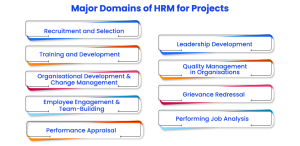
Top 20 MBA HR Project Ideas and Topics for 2025
Human Resource Management (HRM) is a critical aspect of today’s workforce. Those aspiring to start their journey into the field of HR must build a solid base of knowledge to establish their careers in HR. If you’re studying for an MBA and want to know the best HR project topics, then you’ve arrived at the right place! HR projects are compulsory in your MBA studies, as they help you get an understanding of the overall HR functioning. Moreover, with the changing nature of businesses, new challenges and trends influence HR practices, leaving students with a broad range of MBA HR project topics to study. If you want professional HR projects for an MBA, this blog offers a comprehensive list of HR topics for project work that will enable you to shine in both academic and professional life.
Before proceeding forward, you must know how to choose the best HR projects for an MBA, as this will help you in making the right decision that will benefit you in scoring excellent marks academically.

*CollegeVidya
Table Of Content
How to Choose the Best HR-Related Project Topics?
The Increasing Role of HR in Companies
Future Scope of MBA in HR
List of HR Topics for Project
Real-world Examples & Importance of Choosing the Right MBA Projects
Kickstart your HR Career with an online MBA - Parul University
Get Expert MBA Guidance with Jaro Education - from Admission to Success!
Conclusion
Frequently Asked Questions
How to Choose the Best HR-Related Project Topics?
Selecting the appropriate HR project topics for your MBA involves strategic planning and matching the trends in your industry. Begin by investigating a list of HR topics for a project that aligns with your interests and career aspirations. You should consider HRM research topics that illustrate current workplace problems, such as employee motivation, talent acquisition, or performance management.
To identify MBA HR project topics, you need to ascertain the availability of the data and resources and then shortlist the most feasible ones. Opt for HR projects for MBA that allow practical application or case study analysis. Look at fresh and trendy human resource research topics such as AI recruitment and remote workforce management to be modern in the industry.
A strong HR-related project topic choice should also fit with scholarly standards. Make sure the HR projects you are thinking about leave room for qualitative and quantitative analysis. Looking at a list of HR topics for project work from past years can give you ideas about successful strategies.
Look for topics that help develop practical HR solutions. Interaction with industry experts can further sharpen your knowledge and increase your effectiveness. In the end, selecting innovative MBA HR project topics guarantees academic superiority and prepares you for strategic HR jobs.
The Increasing Role of HR in Companies
HR professionals have evolved from merely performing administrative tasks to becoming partners responsible for driving business growth. The current HR function focuses on developing workplace culture, leading innovation, and maintaining an ongoing healthy company. Companies rely on it to maintain employee satisfaction, increase workplace productivity, and thus set a strong employer brand.
With fast-paced changes in the expectations of the workforce and technology, HR has to change and transform. New trends such as remote work, artificial intelligence-based recruitment, and employee wellness programs are transforming HR practices. MBA students with an HR focus will be given in-depth knowledge about these trends and will learn problem-solving skills that are required in today’s competitive job market.
Future Scope of MBA in HR
Organizations are prioritizing talent management, employee engagement, and labor law compliance, leading to a rapid expansion in the need for skilled HR professionals. HR specialization MBA graduates can look forward to various career opportunities, such as:
- HR Business Partner—Working with management to develop HR policies in sync with business objectives.
- The role of a Talent Acquisition Specialist involves overseeing recruitment and selection processes.
- Compensation and Benefits Manager—Crafting competitive pay scales and benefits programs.
- HR Analytics Specialist—Leveraging data insights to enhance workforce efficiency.
- Training and Development Manager– Developing employee capabilities through successful training programs.
HR roles are changing, making it a dynamic and satisfying career option. MBA in HR graduates can hold leadership roles in multinational companies, startups, and government agencies.

*MBASkool
List of HR Topics for Project
Organizations are prioritizing talent management, employee engagement, and labor law compliance, leading to a rapid expansion in the need for skilled HR professionals. HR specialization MBA graduates can look forward to various career opportunities, such as:
- HR Business Partner—Working with management to develop HR policies in sync with business objectives.
- The role of a Talent Acquisition Specialist involves overseeing recruitment and selection processes.
- Compensation and Benefits Manager—Crafting competitive pay scales and benefits programs.
- HR Analytics Specialist—Leveraging data insights to enhance workforce efficiency.
- Training and Development Manager– Developing employee capabilities through successful training programs.
HR roles are changing, making it a dynamic and satisfying career option. MBA in HR graduates can hold leadership roles in multinational companies, startups, and government agencies.

*MBASkool
Real-world Examples & Importance of Choosing the Right MBA Projects
Selecting the appropriate HR projects for an MBA is important since it offers practical knowledge in human resource management. A well-researched project improves problem-solving capabilities and readies students for strategic positions. Investigating MBA HR project topics based on actual industry challenges provides a more profound understanding of industry trends.
Employee engagement is one of the most researched HR projects for MBA. Companies like Google incorporate innovative benefits and a friendly work environment, which is why they are an ideal case study. The application of this technology to HRM problems is quite specific. For instance, recruitment analytics in Amazon’s AI hiring process is an ideal example of an HR project topic associated with modern employment trends.
One more essential subject of human resources research is performance management. A high-performance work culture from Netflix can provide useful information on appraisal setups that work. Apart from this, while looking at the list of HR topics, the students may also see the diversity and inclusion policy of corporations like IBM as one of the elements of project ideas.
The importance of selecting the right MBA HR development project matters because it affects career progression. The study of appropriate HR issues for MBA ensures that students, along with gaining theoretical knowledge, are well-prepared to meet practical HR challenges, making them job-ready in the evolving corporate world.
Kickstart your HR Career with an online MBA - Parul University
Parul University, located in Vadodara, Gujarat, stands as a NAAC A++ accredited university, earning the distinction of being India’s youngest private university to achieve this recognition in its first cycle. As a multidisciplinary destination of learning and innovation, the university embodies a harmonious blend of India’s cultural heritage with modern academic practices. Spanning over 150+ acres of eco-friendly campus, the university is home to over 50,000 students, including 3,500+ international students from 75+ countries, establishing it as a truly global hub of education.
Parul University, which is a leading multi-disciplinary institution in India, offers the ranking MBA in Human Resource Management (HR), which will inculcate students with the latest industry skills and knowledge. Providing cutting-edge infrastructure, experienced faculty, and an interactive learning environment, the university stimulates innovation and experiential learning. The university, which has a strong corporate connection, guarantees placement assistance that will allow students to undergo internships, live projects, and workshops in HR.
Parul University’s MBA HR course blends modern HR trends like HR analytics, AI-powered recruitment, employee engagement initiatives, and talent management, preparing students for leadership positions. The focus on research-based learning in the university allows students to engage in meaningful HR projects for MBA, making them top choices with leading recruiters.
By joining Parul University, you get the benefit of world-class education, state-of-the-art HR research opportunities, and robust industry connections, providing the platform for a promising career in HRM. If you want to identify the best MBA HR project topics while acquiring experience, then Parul University is the place to transform your career goals into reality!
Get Expert MBA Guidance with Jaro Education - from Admission to Success!
Are you embarking on your MBA journey? Jaro Education is at your side throughout the journey. Owing to a solid focus on career development, Jaro offers customized career counseling sessions to assist you in making the correct choice for your MBA specialization, merging with your skill set and goals perfectly.
To make informed career choices, utilize our Skills Gap Calculator, which compares your existing skills and recommends areas for development, enabling you to close the gap between where you are and where you wish to be in your career.
Jaro Education maintains partnerships with top-tier institutions that offer top-notch MBA courses in HR, finance, marketing, and other fields. If you are seeking full-time, part-time, or executive MBA courses, our association with high-profile universities guarantees you global-class education with an industry-oriented curriculum and expert faculty.
Jaro Education prioritizes upskilling, mentorship, and career progression, making it your trusted partner for a promising future. Let the journey to your dream career begin with the finest MBA programs.
Consult today! Head to Jaro Education and begin your MBA journey.
Conclusion
Selecting MBA HR project topics of relevance is significant for ensuring in-depth comprehension of contemporary HRM challenges and their corresponding solutions. It may be related to employee motivation, AI utilization in HR, diversity and inclusion initiatives, or talent management practices. This project’s HR list of topics for discussion will guide your selection. Such HR-related topics of project work do not just benefit your career academically but also train you for real HRM environments.
HR projects for MBA students provide a fantastic platform for discovering real-life HRM problems, piloting creative solutions, and laying a strong foundation for an effective career in human resource management. So, select an intriguing topic, perform extensive research, and provide meaningful inputs to the area of HRM!
Frequently Asked Questions

